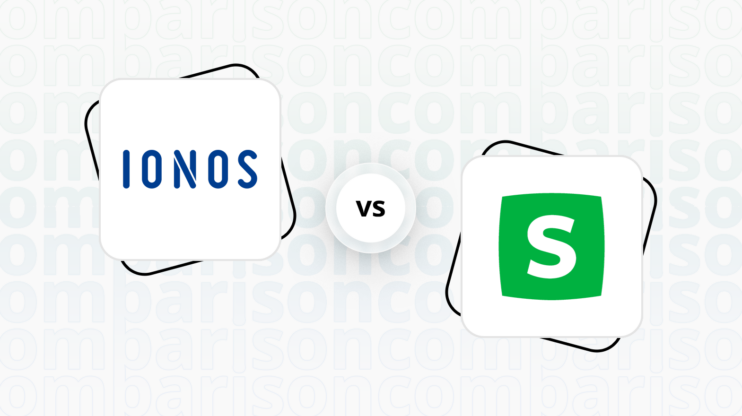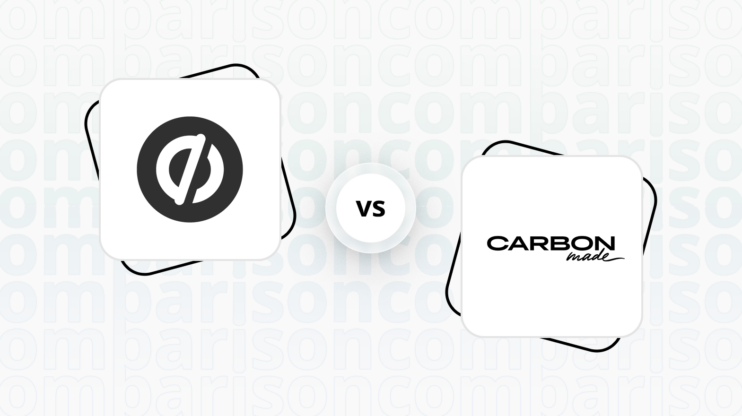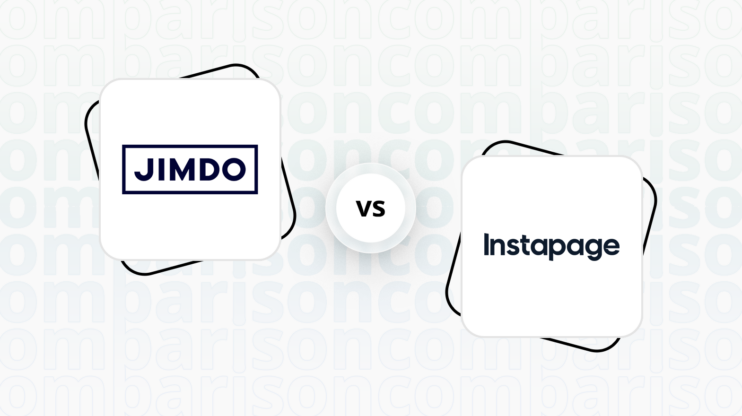Final verdict
BlueHost and SubHub cater to different needs, with BlueHost excelling in general website building and hosting, while SubHub specializes in membership sites.
-
BlueHost (Overall Grade: 6.8/10)
is a versatile website builder and hosting platform that integrates seamlessly with WordPress. It offers a wide range of customizable templates, robust ecommerce features, and comprehensive marketing tools. BlueHost is ideal for users looking for a flexible and powerful platform to create professional websites, blogs, or online stores. Its user-friendly interface and extensive learning resources make it accessible for users of all skill levels. -
SubHub (Overall Grade: 5.6/10)
is designed specifically for creating and managing membership sites. It provides tools tailored for content creators and entrepreneurs who want to build a community and monetize their content. SubHub offers customizable membership website templates, flexible payment processing options, and efficient user management features. While it may not offer the same level of design flexibility or ecommerce capabilities as BlueHost, SubHub is a great choice for those focused on membership-based business models.

|

|
|
|---|---|---|
|
Design functionalities & templates |
7.2 |
6.8 |
|
Ease of use |
8.2 |
7.7 |
|
Ecommerce |
6.8 |
5.9 |
|
Website Editors |
7.3 |
6.9 |
|
Product testing options |
6.2 |
7.0 |
|
Price |
7.2 |
6.8 |
|
Hosting quality |
8.0 |
5.5 |
|
Website speed optimization |
6.5 |
5.6 |
|
Plugins and integrations |
9.1 |
5.7 |
|
Marketing features |
7.3 |
5.7 |
|
Customer support |
7.6 |
6.3 |
|
Security |
8.3 |
4.0 |
|
AI capabilities |
1.5 |
0 |
|
User Management |
4.4 |
5.2 |
Best for ecommerce
 6.8
6.8
 5.9
5.9
Verdict
: BlueHost is better suited for comprehensive ecommerce needs, while SubHub is ideal for membership-based businesses with some ecommerce capabilities.
-
BlueHost
: With a best for ecommerce score of 6.8, BlueHost integrates seamlessly with WooCommerce, providing a robust set of tools for online merchants. It offers product listings, shopping carts, secure payment gateways, shipping options, and inventory management. However, it may have a learning curve for those unfamiliar with WordPress and WooCommerce. -
SubHub
: Scoring 5.9 in best for ecommerce, SubHub is designed for membership sites but supports the sale of physical and digital products. It integrates with PayPal and Stripe for payment processing and offers flexible shipping and tax configurations. However, it lacks support for distributing free products and does not manage the dispatch of physical goods.
Best for informational & business websites
 7.5
7.5
 7.2
7.2
Verdict
: BlueHost is the better choice for creating informational and business websites due to its versatile design functionalities, ease of use, and comprehensive hosting and security features. SubHub, while specialized for membership sites, may not offer the same level of flexibility and support for general informational websites.
-
BlueHost
: BlueHost excels in providing a user-friendly website builder integrated with WordPress, offering over 300 customizable templates. Its drag-and-drop interface and extensive learning resources make it accessible for users of all skill levels. BlueHost’s robust hosting options, including SSD storage and CDN services, ensure fast load times and reliable performance. Additionally, BlueHost’s comprehensive security measures, including SSL certificates and regular backups, provide a secure environment for business websites. With a score of 7.5, BlueHost is well-suited for creating professional-looking informational websites. -
SubHub
: SubHub is designed specifically for creating and managing membership sites, offering tools tailored for content creators and entrepreneurs. While it provides customizable templates and a user-friendly platform, its focus on membership sites may limit its flexibility for general informational websites. SubHub’s hosting options come with storage limitations and lack transparency in uptime statistics and data center locations. Although SubHub emphasizes data privacy and compliance with regulations, it does not disclose specific website security measures. With a score of 7.2, SubHub is ideal for those looking to build a community and monetize content but may not be the best choice for broader informational website needs.
Detailed comparison
Design functionalities & templates
Design FunctionalitiesRepresents how well each platform allows for creative design and customization of websites.Score Components:
- Template Variety (30%): Range and quality of design templates.
- Customization (30%): Flexibility and options for design alterations.
- User Interface (20%): Ease and intuitiveness of the design process.
- Responsiveness (10%): Adaptability to different devices and screen sizes.
- Innovation (10%): Unique design features and tools.
 7.2
7.2
 6.8
6.8
Winner: BlueHost.
If you’re looking for a platform that offers more creative control and a wide array of design features, BlueHost is the preferred choice.
BlueHost’s WordPress website builder offers over 300 pre-installed templates and designs to cater to the diverse needs of its users, ensuring that there’s something for everyone, regardless of the niche or industry. With hundreds of customizable templates available, users can easily find a design that aligns with their vision and brand identity. These templates are designed to be responsive and SEO-friendly, enhancing the user experience and visibility of the websites. From simple blog layouts to complex ecommerce designs, BlueHost provides a comprehensive selection to help users create professional-looking websites with ease.

Compared to BlueHost, SubHub website builder offers a variety of customizable membership website templates designed to cater to different needs and themes, including fitness, yoga, relationship, ministry, learning, craft, wellness, business, and modern living, among others. There are 14 specifically themed templates available, each designed to help users jump-start the design of their membership website homepages. These templates are fully customizable, allowing users to modify layouts, add or remove sections, and tailor content to fit their brand, ensuring flexibility in the design process.
Get a head start on website creation with AI
Create a custom website tailored to your business needs 10X faster with 10Web AI Website Builder!
Ease of use
Ease of useReflects the platform’s overall user-friendliness.Score
Components:
- Learning curve (40%): Quickness and ease of getting started.
- Interface design (30%): Simplicity and intuitiveness of layout.
- User guidance (20%): Quality of tutorials and support.
- Flexibility (10%): Adaptability to various user skills.
 8.2
8.2
 7.7
7.7
🏆 Winner: BlueHost
. Scoring 8.2, BlueHost’s user-friendly interface and drag-and-drop design make it accessible for users of all skill levels. SubHub, with a score of 7.7, also offers a user-friendly platform but is more specialized for building membership websites and online courses.
Learning Resources
🏆 Winner: BlueHost
. BlueHost’s WordPress Academy offers a wide range of free, comprehensive learning resources developed by WordPress experts, aimed at users of all levels. SubHub also offers a range of learning resources, including video guides and tutorials, but does not provide as comprehensive a learning experience as BlueHost.
For ecommerce
EcommerceMeasures the platform’s effectiveness in supporting online business activities.Score Components:
- Ecommerce themes and templates (20%): Variety and design of templates.
- Product management (25%): Ease of managing and organizing products.
- Payment options (25%): Variety and convenience of payment methods.
- Ecommerce features (20%): Features for managing an ecommerce store.
- Integration (10%): Compatibility with external e-commerce tools and services.
 6.8
6.8
 5.9
5.9
When it comes to ecommerce, BlueHost and SubHub offer different sets of features tailored to their respective target audiences. BlueHost, with its integration with WooCommerce, provides a comprehensive toolset for online merchants, including product listings, shopping carts, secure payment gateways, shipping options, tax calculations, and inventory management. However, it may have a learning curve for those unfamiliar with WordPress and WooCommerce.

|

|
|
|---|---|---|
|
Ecommerce themes and templates |
6.5 |
3.0 |
|
Product page customization |
7.0 |
6.5 |
|
Payment processing and commissions |
6.8 |
7.0 |
|
POS capabilities |
0.0 |
0.0 |
|
Payment gateways |
7.5 |
6.0 |
|
Product numbers |
6.0 |
5.0 |
|
Additional ecommerce features |
6.5 |
4.5 |
BlueHost ecommerce features:
- Product Listings
- Shopping Carts
- Secure Payment gateways
- Shipping Options and Tax Calculations
- Inventory Management
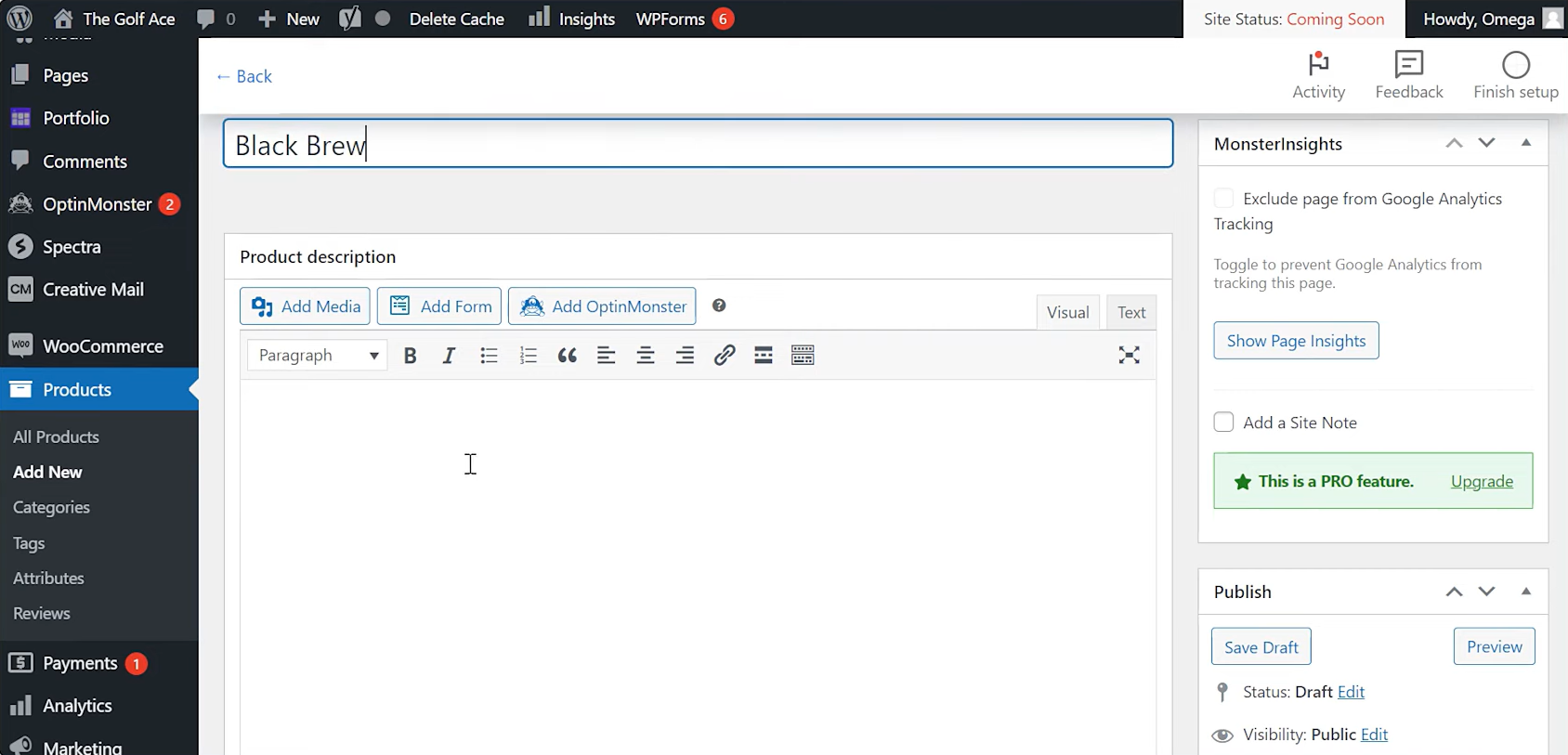
SubHub ecommerce features:
- Paypal and Stripe integration
- Physical and Digital product listings
- Pay-per view products
Ecommerce themes & templates
BlueHost’s website builder for eCommerce provides a selection of specific templates designed to streamline the creation of online stores. These templates are optimized for sales, featuring designs that accommodate product galleries, shopping carts, and checkout processes. However, the customization options might be limited compared to more specialized eCommerce platforms. On the other hand, SubHub does not offer ecommerce specific templates.
Product page customization
BlueHost’s website builder offers robust customization features for product pages, allowing users to tailor product details like titles, descriptions, images, and pricing according to their preferences. It supports the creation of product variants and options, facilitating the sale of items with multiple choices such as size, color, and material directly from the product page. Additionally, the platform allows for the integration of customer reviews and ratings, enhancing trust and potentially boosting sales by providing valuable social proof.
SubHub offers a range of product page customization options, allowing for the addition of physical items, digital downloads, and pay-per-view content. Features include the ability to manage product variants, upload images, and set visibility preferences. Users can also implement SEO strategies through meta tags and manage tax settings. Additional functionalities include member-specific discounts, image carousels, and individualized shipping costs.
Payment processing
BlueHost doesn’t directly support numerous payment gateways. However, it does integrate with WooCommerce, a platform that facilitates integration with various payment gateways like PayPal and Stripe. While BlueHost doesn’t impose transaction fees, the payment gateways might. Furthermore, it lacks Point of Sale (POS) capabilities.
SubHub website builder supports two main payment gateways: Stripe and PayPal. These integrations allow for secure payment processing for subscriptions and store items using debit or credit cards. The platform itself does not charge commissions on transactions.
Website Editors
Website EditorsEvaluates the platforms’ website building and editing capabilities.Score Components:
- Customization tools (40%): Range and power of editing features.
- Editor usability (30%): User experience within the editor.
- Design flexibility (20%): Freedom in layout and design changes.
- Update and maintenance ease (10%): Simplicity of updating and maintaining the site.
 7.3
7.3
 6.9
6.9
🏆
Winner: BlueHost
. BlueHost, with a score of 7.3, offers a user-friendly website builder that integrates seamlessly with WordPress, allowing for a wide range of customization options and access to thousands of themes and plugins. It features a drag-and-drop interface, making it accessible for users with little to no coding experience.
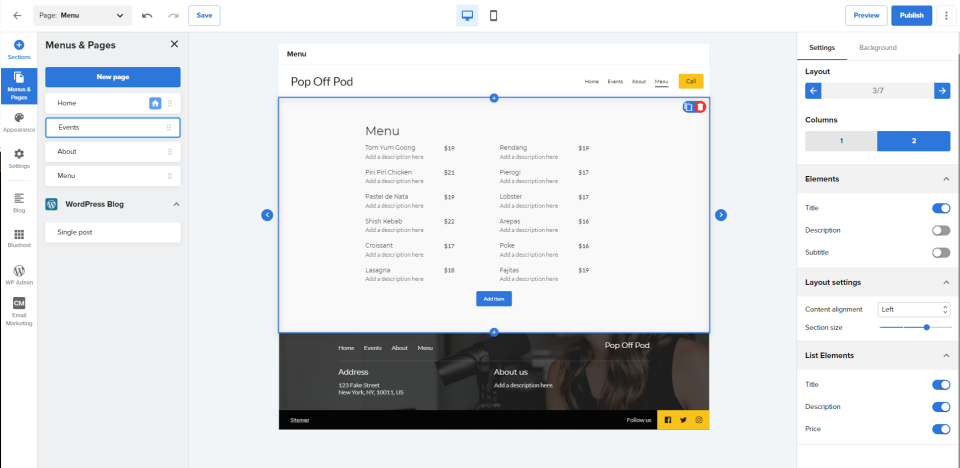
SubHub’s editor, scoring 6.9, is designed specifically for creating and managing membership sites. It offers a range of tools tailored for content creators and entrepreneurs who aim to build a community and monetize their content. While it may not offer the same level of design flexibility as BlueHost, SubHub’s editor is optimized for ease of use and efficiency.
Mobile editor/app
 5.0
5.0
 4.0
4.0
🏆
Winner: BlueHost
. Both BlueHost and SubHub do not offer a dedicated mobile editor app. However, they allow users to manage some content on their websites using the mobile browser version.
BlueHost, despite not having a dedicated mobile app, allows users to edit their website on a mobile browser, albeit with some limitations. This means that users can make some changes to their website on the go, which can be convenient in certain situations.
On the other hand, SubHub also allows users to manage some content on their website using the mobile browser version. However, it’s not possible to change the layout and design of the website on mobile, which can be a significant limitation for users who want to make substantial changes to their website while on the move.
Given these considerations, BlueHost comes out slightly ahead in this category due to its slightly less restrictive mobile editing capabilities.
Product testing options
Product Testing OptionsAssesses the options for trying out platform features before commitment.Score Components:
- Trial quality (40%): Extent and usefulness of the trial or free version.
- Feature accessibility (30%): How many features are available to test.
- Trial duration (20%): Length of the trial period.
- Ease of transition (10%): Smoothness of moving from trial to paid plans.
 6.2
6.2
 7.0
7.0
Overall Result
:
SubHub Wins
. SubHub scores 7.0, slightly higher than BlueHost’s 6.2. SubHub offers a 14-day free trial, during which users can test premium features. BlueHost, on the other hand, does not offer a free trial but allows users to test premium features within a 30-day refundable period.

|

|
|
|---|---|---|
|
Free Plan |
No | No |
|
Trial Duration |
No |
14 days |
|
Testing Premium Features |
Within 30-day refundable period |
During the free trial |
|
Money Back Guarantee |
30-day money back guarantee |
7-day money back guarantee |
Price
PriceLooks at the cost-effectiveness and value for money of each platform.Score Components:
- Plan value (40%): What each pricing tier offers.
- Transparency and clarity (30%): Clearness of pricing structures.
- Flexibility of plans (20%): Range of options to suit different budgets.
- Hidden costs (10%): Additional expenses not included in the plan.
 7.2
7.2
 6.8
6.8
BlueHost offers a wider range of plans and a higher discount on annual subscriptions, making it a more cost-effective option compared to SubHub.

|

|
|
|---|---|---|
|
$10-$20 |
Basic ($15.99/month): Made for a simple website or blog, 1 website with 10GB SSD storage, Free CDN, Free Domain 1st year, Managed WordPress Hosting, Free SSL 1st year and Chat Support. Value for price: 6.5 |
No offering at this amount. |
|
$20-$30 |
Choice Plus ($27.99/month): Ideal for multiple sites needing storage, security, backups, 3 websites with 40GB SSD storage, Free CDN, Free Domain 1st year, Managed WordPress hosting, Free SSL, Free Domain privacy 1st year, Malware scanning, daily site backups are free for the 1st year with the purchase of a 12 or 36-month package. Otherwise, users are required to pay a one-time fee of $35.88 for backup services. Value for price: 7.5 |
No offering at this amount. |
|
$30-$35 |
Online Store ($32.99/month): Great for all online selling, built-in eCommerce tools, 3 websites with 40GB SSD storage, Free CDN, Free Domain 1st year, Managed WordPress hosting, Free Domain privacy 1st year, Malware Scanning, Exclusive Theme Store, Store Analytics, Unlimited products, Secure Payment options, Bookings & appointments, Shipping labels, product search and filtering, daily site backups are free for the 1st year with the purchase of a 12 or 36-month package. Otherwise, users are required to pay a one-time fee of $35.88 for backup services. Value for price: 8.5 |
No offering at this amount. |
|
$35-$50 |
Pro ($39.95/month): Perfect for high traffic, advanced storage, security, 5 websites with 100GB SSD storage, Free CDN, Free Domain 1st year, Managed WordPress hosting, Free SSL, Free Domain privacy 1st year, Malware Scanning, daily site backups are free for the 1st year with the purchase of a 12 or 36-month package. Otherwise, users are required to pay a one-time fee of $35.88 for backup services. Value for price: 9.0 |
Starter ($47/month): Up to 500 members, 5 GB storage, secure payment processing, course builder, 5 landing pages, e-commerce. Value for price: 6.5 |
|
$90-$100 |
No offering at this amount. |
Pro ($97/month): Up to 2000 members, 50 GB storage, removes SubHub branding, 15 landing pages, along with Starter features. Value for price: 7.5 |
|
$100+ |
No offering at this amount. |
Premium ($147/month): Unlimited members, 200 GB storage, email white labelling, 30 landing pages, plus all Pro features. Value for Price: 8.5 |
location. As a result in rare cases the prices displayed here can differ from the ones you see on their
websites.
Hosting quality
Hosting
qualityExamines the reliability and performance of the hosting solutions.Score Components:
- Uptime (40%): Consistency and reliability of website availability.
- Speed (30%): Loading times and performance.
- Bandwidth and storage (20%): Sufficiency of resources provided.
- Data centers (10%): Quality and distribution of hosting infrastructure.
 8.0
8.0
 5.5
5.5
Winner: BlueHost
. BlueHost offers a range of hosting options with features designed to support websites at various stages of growth, from shared to dedicated hosting. Their hosting plans include technologies to ensure fast load times, such as SSD storage, CDN services, and Cloudflare integration. On the other hand, SubHub offers hosting with storage limitations depending on the plan and daily backups. However, SubHub does not provide uptime statistics or guarantees and does not disclose the locations of its data centers.

|

|
|
|---|---|---|
|
Do they offer hosting? |
Yes, offers a range of hosting options with features designed to support websites at various stages of growth. | Yes, from 5GB to 200GB storage limitation depending on the plan and daily backups. |
|
Data Centers: |
6 data centers: Orem and Provo, Shanghai, Mumbai and Hong Kong, London | Subhub does not disclose the locations of its data centers |
|
Type of hosting: |
Managed WordPress Hosting | Managed Cloud Hosting |
|
Uptime: |
99.9% | Subhub does not provide uptime statistics or guarantees |
|
Uptime Guarantee: |
Yes, 99.9% | No |
Website Speed Optimization
Website Speed OptimizationEvaluates optimization of website loading timesScore Components:
- PageSpeed Score (30%): Google’s score indicating performance optimization.
- Loading Time (30%): The average time until a website is fully interactive.
- Mobile Optimization (15%): Optimization effectiveness for mobile devices.
- Resource Optimization (15%): Optimizing images, scripts, and other heavy resources.
- CDN Usage (10%): Use of CDN to enhance speed across geolocations.
 6.5
6.5
 5.6
5.6
🏆 Winner: BlueHost
Both BlueHost and SubHub have strategies in place for website speed optimization, but BlueHost takes the lead with its emphasis on Core Web Vital improvements and server optimization.

|

|
|
|---|---|---|
|
Focus |
CDN, Server Optimization |
Image Optimization, Caching, Mobile Optimized design |
|
Performance Tools |
Google Lighthouse, PageSpeed Insights |
Google PageSpeed Insights |
|
Key Strategies |
CDN, Server Optimization |
Image Optimization, Caching, Mobile Optimized design |
|
Load Times |
Varies widely, depending on the optimization, website complexity |
Varies depending on optimization and website complexity |
|
Page Speed Scores Range |
Varies widely, depending on the optimization, website complexity |
Varies depending on optimization and website complexity |
|
Core Web Vitals Improvement |
Emphasis on LCP, FID, CLS improvements |
No information provided |
BlueHost, a comprehensive web hosting service, also offers a user-friendly website builder. It focuses on server optimization and CDN for speed optimization. The load times and PageSpeed scores vary widely, depending on the optimization and website complexity. However, BlueHost places a strong emphasis on improving Core Web Vitals, specifically LCP, FID, and CLS.
On the other hand, SubHub, a website builder designed specifically for creating and managing membership sites, focuses on image optimization, caching, and mobile-optimized design for speed optimization. Like BlueHost, the load times and PageSpeed scores vary depending on the optimization and website complexity. However, SubHub does not provide any information on their Core Web Vitals improvements.
Get a head start on website creation with AI
Create a custom website tailored to your business needs 10X faster with 10Web AI Website Builder!
Plugins and integrations
Plugins and integrationsMeasures the range and effectiveness of additional plugins and integrations.Score Components:
- Variety of options (40%): Range of available add-ons.
- Integration smoothness (30%): Ease of integrating plugins into the site.
- Quality of plugins (20%): Functionality and reliability of the options.
- Custom integration capabilities (10%): Support for custom or third-party integrations.
 9.1
9.1
 5.7
5.7
🏆 Winner: BlueHost.
With a score of 9.1, BlueHost takes the lead in this category. Its seamless integration with WordPress opens up a vast ecosystem of plugins and extensions, ranging from SEO tools to e-commerce solutions. SubHub, scoring 5.7, offers a comprehensive toolkit for creating and managing membership sites, but its range of external integrations is limited compared to BlueHost.
Marketing Features
Design FunctionalitiesRepresents how well each platform allows for creative design and customization of websites.Score Components:
- Template Variety (30%): Range and quality of design templates.
- Customization (30%): Flexibility and options for design alterations.
- User Interface (20%): Ease and intuitiveness of the design process.
- Responsiveness (10%): Adaptability to different devices and screen sizes.
- Innovation (10%): Unique design features and tools.
 7.3
7.3
 5.7
5.7
🏆
Overall Winner: BlueHost
. BlueHost stands out for its comprehensive marketing tools, especially in SEO and email marketing. SubHub, while strong in SEO and email marketing, lacks social media integration.
| Marketing Features |

|

|
|---|---|---|
|
SEO Tools |
|
|
|
Email Marketing |
|
|
|
Blogging |
|
|
|
Social Media Integration |
|
|
|
Analytics and Reporting |
|
|
|
Ads and Promotions |
|
|
Customer Support
Customer supportEvaluates the quality and availability of support options.Score Components:
- Response time (40%): Speed of support responses.
- Support quality (30%): Effectiveness and helpfulness of the support.
- Availability (20%): Range of support channels (phone, chat, email).
- Resource richness (10%): Quality of self-help and educational materials.
 7.6
7.6
 6.3
6.3
🏆 Winner: BlueHost
. In the BlueHost vs SubHub comparison, BlueHost takes the lead with a customer support score of 7.6. BlueHost offers 24/7 support through chat and phone, with specific hours for technical assistance and account-related inquiries. This ensures that users can get help whenever they need it, making it a reliable option for those who may encounter issues at any time.
SubHub, on the other hand, provides customer support primarily through email and a support portal, with an FAQ section for common questions. While this setup can be effective for less urgent issues, it lacks the immediacy and round-the-clock availability that BlueHost offers. With a customer support score of 6.3, SubHub’s support system is more limited, which may be a drawback for users who require more immediate assistance.
Security
SecurityLooks at the platforms’ security measures and data protection.Score Components:
- Data protection (40%): Safeguards for user and customer data.
- SSL and encryption (30%): Implementation of secure connections.
- Compliance (20%): Adherence to industry security standards.
- Regular updates (10%): Frequency of security updates and patches.
 8.3
8.3
 4.0
4.0
🏆
Winner: BlueHost
. BlueHost’s security measures are more comprehensive and transparent compared to SubHub. BlueHost prioritizes data protection through SSL certificates, regular backups, and additional security features like SiteLock for malware scanning. They also provide automated backups to safeguard website data, allowing for easy restoration in case of loss or compromise. The hosting service incorporates secure configuration options and plugins, especially for WordPress hosting, to bolster website defenses. Additionally, BlueHost implements 24/7 monitoring to promptly detect and respond to security threats, along with malware scanning and removal processes to protect websites from malicious software, ensuring a secure and reliable hosting environment for users.
On the other hand, SubHub does not disclose any specific information about the website security measures they provide. Their focus is more on data privacy and compliance with GDPR and CCPA regulations. However, without clear information on website security measures, it’s difficult to assess the level of protection they offer to their users’ websites.
AI Capabilities
AI capabilitiesMeasures the effectiveness of AI-driven features and tools.Score Components:
- Automation efficiency (40%): Impact of AI on streamlining processes.
- Personalization (30%): AI-driven customization for users or customers.
- AI-Assisted design (20%): Role of AI in website design and functionality.
- Data analysis (10%): Use of AI in interpreting user data and analytics.
 1.5
1.5
 0
0

|

|
|
|---|---|---|
|
Personalized Design |
|
|
|
SEO Optimization |
|
|
|
Customer Behavior Analysis |
|
|
|
Sales Predictions |
|
|
|
Inventory Management |
|
|
|
Content Generation |
Possible through WordPress plugins |
|
🏆 Winner: BlueHost
. Neither BlueHost nor SubHub have built-in AI capabilities. However, BlueHost supports integration with WordPress plugins, some of which offer AI content generation features. This gives BlueHost a slight edge over SubHub in terms of AI capabilities. BlueHost scores 1.5 for AI capabilities, while SubHub scores 0.
User Management
User ManagementAssesses the platforms’ capabilities in managing user roles, permissions, and accessibility.Score Components:
- Role Customization (40%): Flexibility in creating and defining user roles and
permissions. - Ease of Management (30%): User interface and tools for managing users.
- Access Control (20%): Effectiveness of access control measures for different user
levels. - Scalability (10%): Ability to manage a growing number of users efficiently.
 4.4
4.4
 5.2
5.2
🏆 Winner: SubHub
. Both BlueHost and SubHub support multi-user management, but SubHub provides more detailed information about user roles and access levels.
- BlueHost does support multi-user management, however there’s no mention about the number of users or their roles and permissions.
- SubHub allows multiple user accounts, however the platform does not specify how many accounts are supported.
SubHub User Roles and Access Levels:
| Role | Description | Access Highlights |
|---|---|---|
| Administrator | Full access to the platform except for Homepage and Course Editor. | Can manage all aspects of the platform, including content, store, and member management. |
| Content Management | Focuses on managing and organizing content within the platform. | Can access and manage content-related features but does not have access to Homepage or Course Editor. |
| Store (access only) | Specializes in handling the platform’s store features. | Limited to store management functions; no access to Homepage, Course Editor, or member management. |
| Member Manager (access only) | Oversees member accounts, roles, and subscriptions. | Can manage members and their subscriptions but cannot access Homepage, Course Editor, or store management. |
| Origin Admin Email | The initial administrator with the highest level of access, including Homepage and Course Editor. | Exclusive access to Homepage and Course Editor, on top of what the Administrator role provides. |
Additional Features

|

|
|
|---|---|---|
|
SSL Certificate |
|
|
|
Custom Domain |
|
|
|
Free Custom Domain Included |
|
|
|
International Domains |
|
|
|
Mobile Responsive |
|
|
|
Page Speed |
|
|
|
Website Builder Mobile App |
|
|
|
Convert a Website To An App |
|
|
|
Website Analytics |
|
|
|
Multilingual Sites |
|
|
|
Multiple Users |
|
|
User Feedback
Users appreciate BlueHost for its comprehensive free offerings, including SSL, subdomains, and custom email, along with additional services like free domain registration and CDN. The platform’s intuitive interface and user-friendly website builder cater to both beginners and experienced developers. However, concerns arise regarding the significant price increase upon renewal, limited free website templates, and unresolved technical issues with poor customer support, hindering users’ ability to effectively manage their websites and businesses. Addressing these concerns could enhance overall user satisfaction with BlueHost.
User feedback on SubHub presents a mix of positive and negative experiences, emphasizing the platform’s feature-rich environment and customizable templates. Users appreciate the flexibility and the quality of customer service, highlighting the platform’s continual updates and support as key benefits. However, some users express dissatisfaction with aspects such as the platform’s interface, lack of community features, and service fees for ticket resale. Concerns were also raised about the custom design service and mobile-friendly solutions taking longer than expected.
The making of this blog
We followed a clear, step-by-step process to write and research this article.
FAQ
Which platform is better for building a membership site, BlueHost or SubHub?
Can I use BlueHost for ecommerce?
What are the main differences in website speed optimization between BlueHost and SubHub?
How do BlueHost and SubHub compare in terms of customer support?
Which platform offers better security features?
Are there any AI capabilities in BlueHost or SubHub?
What are the pricing options for BlueHost and SubHub?
Which platform is recommended for users with no coding experience?










